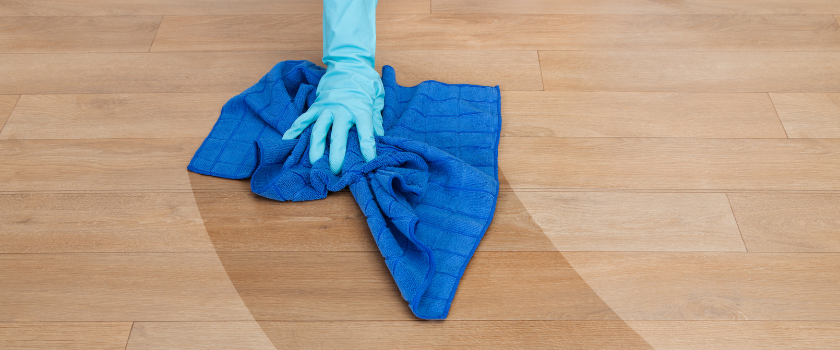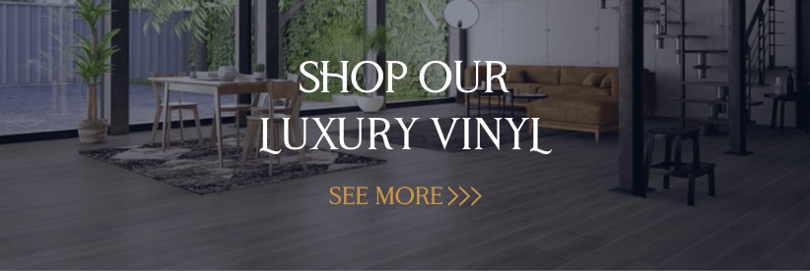Vinyl flooring is an excellent choice for high-traffic areas, and it's easy to clean once you learn a few easy steps.
With vinyl flooring, you remove the need to spend time scrubbing the floor to keep it looking its best. And, unlike carpeting, it won’t collect dirt over time and require occasional steam cleaning to stay fresh.
Importance of Cleaning Vinyl Floors
Homeowners can keep their vinyl floors looking great with frequent light cleaning and regular deep cleaning using the right products. Regular maintenance will keep your vinyl flooring looking great for years to come.
Supplies Needed To Clean Floors
Before you start, gather all the supplies you need to clean the floor.
You will need the following tools:
- Vacuum, broom, or dust mop
- Wet mop
- Bucket
- Cleaning rags or cloths
- Warm water
- Cleaning solution (commercial or do-it-yourself)
Types of Floor Cleaners
Vinyl floors are designed with ease of cleaning in mind, so there is no need for expensive or harsh cleaning products.
Concentrated cleaners are designed to mix with water in a bucket or spray bottle before use. Other cleaners may come ready to use in spray bottle dispensers. Make sure the cleaner you choose is aimed at vinyl floors.
Avoid cleaners that contain wax, ammonia, or detergent, which can damage your flooring. You should also avoid abrasive cleaners because they can scratch the floor, ruining the finish. Finally, do not use cleaners designed for hardwood floors.
Natural Floor Cleaners
Commercial vinyl floor cleaners offer convenience, but many people prefer to create their own floor cleaning solutions. Vinegar or baking soda are the best options for cleaning the floor with natural products.
Apple cider or even white vinegar are great natural cleaners for vinyl flooring. To create your cleaning solution, mix one cup of vinegar with a gallon of very warm water. Use this for mopping in place of a commercial cleaning solution.
To clean up stains, consider creating a baking soda paste. Combine baking soda and water until you have a paste that you can apply to the floor using a rag.
How to Clean Vinyl Floors?
Step 1: Start Dry
On a daily or at least weekly basis, do a dry cleaning of your vinyl floors. You can use a soft broom, a dust mop, or a vacuum. If you choose to vacuum, do not use attachments designed for carpets, such as beater bars.
If you are going to do a deep cleaning, it’s important to remove all debris from the floor beforehand. Sweep from the corners toward the center of the room, making sure to get under furniture and along baseboards.
Step 2: Get Wet - Mopping
Read your manufacturer’s specific instructions before beginning the deep cleaning using water.
Most vinyl floors are water-resistant, but they may not be waterproof. Apply your cleaning solution using only the amount you need. Make sure you wring out mops and do not allow puddles to pool on the flooring.
Step 3: Rinse Cycle
The best way to avoid a sticky floor is to do a rinsing pass after you complete the cleaning. This prevents the build-up of residue on your vinyl flooring. After mopping, fill a bucket with cleaning water and pass over the floors.
Step 4: Scuffs and Stains
Once the floor is clean, you may notice some stains or scuff marks. To clean these spots, use a baking soda paste, WD-40, or jojoba oil on a soft cloth. Baking soda is especially effective on stains. For markers, makeup, or ink, you may need to use a small amount of rubbing alcohol or acetone-free nail polish remover.
Step 5: Keeping it Beautiful
To keep your floors beautiful in the future, make sure that you clean up spills promptly. Protect your floors by using felt pads on furniture, rugs in busy areas, and doormats at any outside doors.
How to Choose Vinyl Flooring
Your choice of vinyl flooring also will make a difference in maintenance and upkeep. Consider Luxury Vinyl vs Laminate Flooring for a more durable option. If you prefer the look of plank flooring, consider Luxury Vinyl Plank Flooring.
Vinyl flooring is typically water-resistant, but not necessarily waterproof. This is especially important for basements. If you are looking for waterproof basement flooring, consider the options for Waterproof Basement Flooring.
Let us help you start your next vinyl flooring project. Contact us or request an estimate today!
 NATIONWIDE SHIPPING AVAILABLE!
NATIONWIDE SHIPPING AVAILABLE!





.webp?width=762&height=464&name=design-room%20(2).webp)







